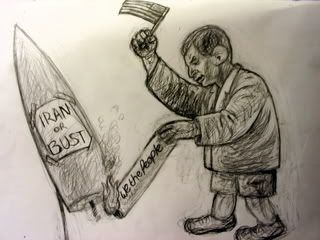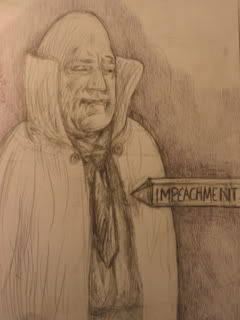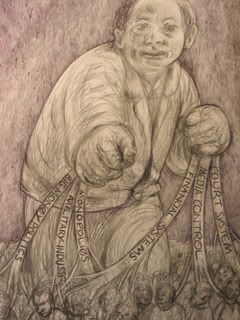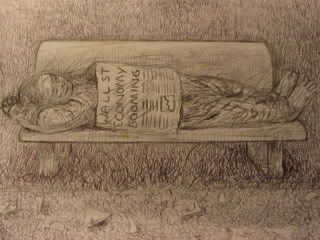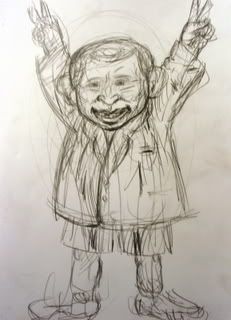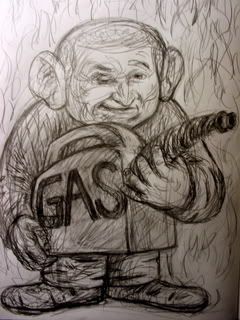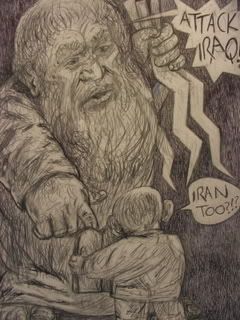I only get PBS television, so the forum hosted by Tavis Smiley last night was the first one I’ve been able to see. It was held at Howard University and it focused on issues of Black America, which I was glad of, because I think those are issues crucial to All America. Although we Americans pride ourselves on our history of tolerance and diversity – and there are some good reasons for that – I think it would be truer to say that we have been a nation of racism, intolerance and attempted monoculture.
I think that the legacy of our dark past still afflicts our society today, in racism and in various forms of fascistic thinking that have become enshrined in our culture, that unfold in the widening gap between rich and poor; in imperialism and military recklessness globally (usually directed at brown people); in a prison system that is the largest in the world and that disproportionally targets people of color; in the dominance of the State and the Corporatocracy over the personal lives of Americans; etc..
All this is highlighted, of course, by the Supreme Court decision which came out just yesterday, which overturns decades of affirmative action in schools (as I understand the decision). When I was in school, I understood affirmative action as a critical part of the educational process, because education inherently benefits from diversity. It seems to me that yesterday’s decision was a milestone victory for monoculture, and I think monoculture is a core principle of fascism (eg, think of the Nazi crusade to purify Germanic culture), so I feel that our Supreme Court took us all a giant step towards fascism yesterday.
Here’s a good diary on the SCOTUS decison:
http://www.neverinournames.com/showDiary.do;jsessionid=4224E571A390DEA59BE863F812B42143?diaryId=1693
The timing of last night’s Presidential debate, or forum, was thus sparkling. The debate itself, unfortunately, was not.
Overall, I was very disappointed. I think part of the problem was the format. Tavis said that the goal was to get in as many questions as possible. Because of this, they limited responses from candidates to one minute – and then, halfway through, they cut from one minute to thirty seconds! It seemed really obvious to me that the Candidates had difficulty responding to the very challenging questions in a minute or less. I would argue that the overall affect of the chosen format was to ensure that NO questions got answered. They would have done much better with fewer questions and more time allotted per response.
Or, perhaps, they should have tailored the questions that were being asked, so that the questions would lend themselves to quick answers. I think both the candidates and the issues were drastically shortchanged by the Chosen format. Considering the timing, this was cruelly ironic. These issues have long been shortchanged far too much.
I cannot honestly remember very well what the candidates said. They just seemed unfocused. And it was late at night when I saw the rebroadcast, to be fair, so maybe I too was unfocused. Hillary, true to Clinton tradition, seemed both assertive and vague, citing detail effectively from a rhetorical point of view, but not in a way that clarifed her basic positions. Biden was very angry about Darfur, as we all should be. Richardson was hapless, unable to articulate clearly. Edwards seemed uncomfortable and insincere. Obama was torn between his progressive image and his addiction to right wing talking points. Kucinich was the most clear and the most solid on the issues, but seemed somehow like a guy hanging in there mainly to stretch the discussion (not a bad thing in itself, of course). Gravel was very annoying. Yes, he is willing to go after Sacred Cows that the others won’t touch, which is a good thing, but he seemed obsessed with the sales tax, which is an inherently regressive tax, and he was often inappropriately aggressive. Dodd was solid, but seemed caught up in Senate Battles of Old.
If I had to pick a highlight, I couldn’t. The low point was probably Edwards, loudly proclaiming his passion about poverty, rather than simply showing it via how he talked ABOUT poverty. Don’t tell us, John. Show us.
I’ve been strongly in Edwards’ corner up till now, because he has seemed to me to be the only candidate who really ‘gets’ poverty, despite his personal wealth. I’m STILL in his corner, but I wasn’t encouraged by what I saw last night.
Perhaps ironically, I’ve been strongly opposed to Hillary, because I think her track record is one of talking the progressive talk, yet walking the corporatist walk when the chips are down (same as Bill). And when it comes to Iraq and Iran and Palestine/Israel, she seems to be a straight on Hawk. I’m not entirely sure she’d be any slower to hit the “war” button than W.
But I have to admit that last night she seemed the sole professional amongst amateurs. Is that good or bad? I’m not sure. But I have to admit that she handled the difficult format with (relatively) amazing aplomb. I appreciated that.
Kucinich seemed the best candidate, in terms of his solid grasp of the issues and of the way they interconnect. He moved easily back and forth amongst problems created by free trade that isn’t fair trade; by the cost of the Iraq war (in terms of morality and in terms of money); by the justice system that isn’t just; by the educational system that isn’t equal but is separate; and so on. But I can’t seem to throw off the impression that he is not quite fully committed to the idea of actually being President. It’s like he knows he is the underdog and he’s TOO comfortable with that status.
So, overall, I was disappointed with the Dem candidates. I hope the format was at fault.

